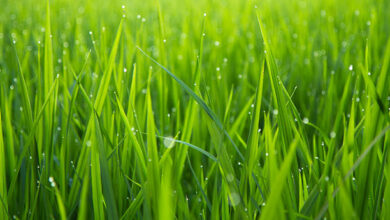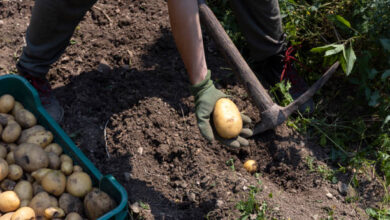Popular Flowers That Start with ‘P’: Varieties, Characteristics, and Growing Tips
Flowers That Start with 'P'
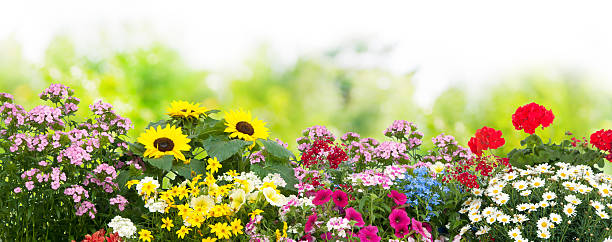
Popular Flowers That Start with ‘P’: Varieties, Characteristics, and Growing Tips
Flowers That Start with ‘P’ bring a diverse array of colors, shapes, and scents to gardens. From the elegant peony to the vibrant petunia, these flowers offer something for every gardener. In this guide, we’ll explore various flowers that start with ‘P,’ their unique characteristics, and tips for growing them successfully in your garden.
Why Choose Flowers That Start with ‘P’?
Flowers that start with ‘P’ are popular for their beauty, variety, and ease of care. They can add splashes of color and unique textures to your garden, making them a favorite among gardeners. Additionally, these flowers can thrive in a range of environments, from sunny beds to shaded areas, providing versatility in garden design.
Popular Flowers That Start with ‘P’
There are many flowers that start with ‘P,’ each with its own charm and growing requirements. Here, we’ll delve into some of the most beloved varieties.
- Peony
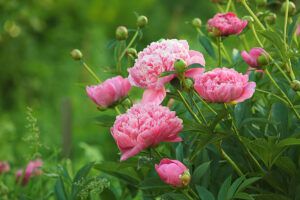
Peonies are known for their large, lush blooms and delightful fragrance. They come in various colors, including pink, white, red, and yellow. Peonies bloom in late spring to early summer and can thrive in both full sun and partial shade.
– Planting Tips: Plant peonies in well-drained soil with plenty of organic matter. Space them about 3-4 feet apart to allow for growth.
– Care Tips: Peonies require minimal maintenance once established. Water them regularly during dry spells and deadhead spent blooms to encourage new growth.
- Pansy
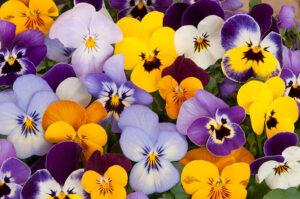
Pansies are cherished for their cheerful, multi-colored flowers and heart-shaped petals. They are perfect for adding color to garden beds, containers, and borders. Pansies bloom in cool weather, making them ideal for spring and fall gardens.
– Planting Tips: Plant pansies in rich, well-drained soil. They prefer full sun to partial shade.
– Care Tips: Water pansies regularly and deadhead faded flowers to promote continuous blooming. Mulching can help retain soil moisture and keep roots cool.
- Petunia
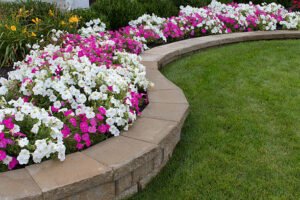
Petunias are versatile and come in a wide range of colors and patterns. They are excellent for hanging baskets, containers, and garden beds. Petunias bloom from spring to frost and thrive in full sun.
– Planting Tips: Use well-drained soil enriched with compost. Space petunias about 12 inches apart.
– Care Tips: Water petunias regularly, especially during hot weather. Pinch back leggy stems to encourage bushier growth and more blooms.
- Primrose
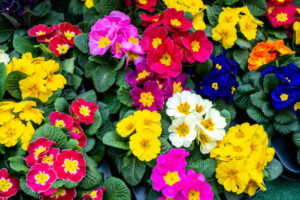
Primroses are among the first flowers to bloom in spring, offering a burst of color after winter. They come in various shades, including yellow, pink, red, and blue. Primroses prefer cool, moist environments.
– Planting Tips: Plant primroses in humus-rich, well-drained soil. They thrive in partial to full shade.
– Care Tips: Keep the soil consistently moist and mulch around the plants to retain moisture. Remove faded flowers to encourage more blooms.
- Phlox
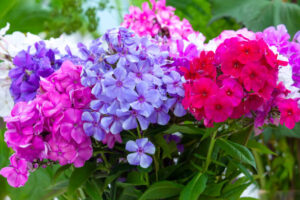
Phlox flowers are known for their dense clusters of small, star-shaped blooms. They come in a variety of colors, including pink, white, red, and purple. Phlox is perfect for ground cover, borders, and rock gardens.
– Planting Tips: Plant phlox in well-drained soil with plenty of sunlight. Space them about 12-18 inches apart.
– Care Tips: Water phlox regularly and ensure good air circulation to prevent mildew. Deadhead spent flowers to prolong blooming.
- Poppy
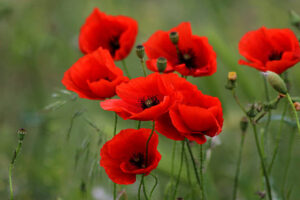
Poppies are striking flowers with delicate, papery petals and vivid colors, such as red, orange, and pink. They bloom in late spring to early summer and are loved for their vibrant display.
– Planting Tips: Sow poppy seeds directly in the garden in well-drained soil. They prefer full sun.
– Care Tips: Poppies require little maintenance. Water them during dry spells and allow the soil to dry out between watering.
- Periwinkle
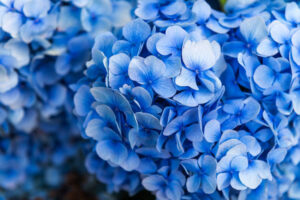
Periwinkle, also known as Vinca, is a low-growing plant with glossy leaves and charming blue or purple flowers. It is excellent for ground cover and thrives in various conditions.
– Planting Tips: Plant periwinkle in well-drained soil. It tolerates both sun and shade.
– Care Tips: Water periwinkle regularly, but avoid overwatering. Trim back any overgrown stems to maintain its shape.
- Pasque Flower
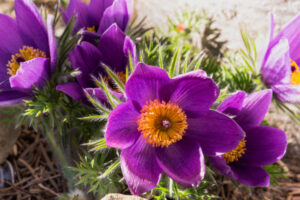
Pasque flowers are early bloomers with unique, bell-shaped flowers in shades of purple, red, and white. They have feathery foliage and thrive in well-drained soil.
– Planting Tips: Plant pasque flowers in sunny locations with well-drained soil. They prefer cooler climates.
– Care Tips: Water moderately and avoid waterlogged soil. Cut back old foliage in late fall to make way for new growth.
YOU MAY LOVE TO READ
Popular Flowers That Start with ‘C’: Varieties, Characteristics, and Growing Tips
Popular Flowers Beginning with ‘S’: Varieties, Characteristics, and Growing Tips
Choosing the Right ‘P’ Flower for Your Garden
To select the right ‘P’ flower for your garden, consider factors like climate, soil type, sunlight, and maintenance preferences. Here’s a quick comparison:
| Flower | Ideal Conditions | Blooming Season | Maintenance Level |
| Peony | Full sun/partial shade | | Late spring/early summer | Low |
| Pansy | Full sun/partial shade | Spring/fall | Medium |
| Petunia | Full sun | Spring to frost | Medium |
| Primrose | Partial/full shade | Early spring | Medium |
| Phlox | Full sun | Spring/summer | Medium |
| Poppy | Full sun | Late spring/early summer | Low |
| Periwinkle | Sun/shade | Spring/summer | Low |
| Pasque Flower | Full sun | Early spring | Low |
Conclusion
Flowers that start with ‘P’ offer a wide range of options for adding beauty and variety to your garden. By understanding their unique characteristics and growing requirements, you can choose the perfect ‘P’ flowers to enhance your outdoor space. Start planting these gorgeous flowers today and enjoy their vibrant blooms throughout the seasons.

